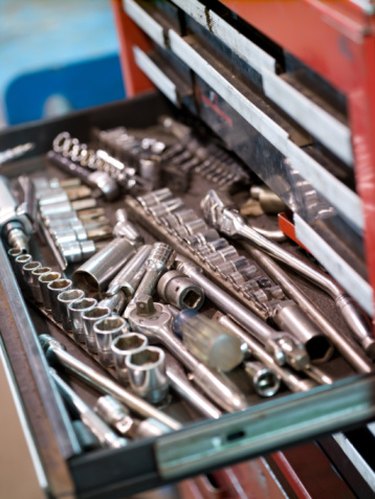
Perishable tools are expendable items in a tool inventory because of their size and the way they're used. They are expected to be consumed and discarded, unlike most other tools. Due to these tools' need for constant replacement, the at-home handyman needs to manage these tools a bit more carefully. Drill bits, cutters, reamers and sockets are common examples of perishable tools.
Drill Bits
Video of the Day
A drill bit is a small metal cutting tool attached at the end of a drill. Common drill bits create cylindrical holes; some special-purpose bits make non-cylindrical ones. Drill bits are available in various shapes, sizes and materials. As a result of repeated use, drill bits become dull. Some sharpening may remedy the situation, but drill bits need to be replaced eventually.
Video of the Day
Cutters
Cutters, whether single-point or multi-point, remove pieces from a material through shearing. Single-point cutters have one sharp edge and are used in shaping or planning; multi-point cutters have two or more edges used in milling and grinding. Cutters may have a long working life if taken care of properly. In factories where they are constantly used, the wear and tear is inevitable and regular replacement is necessary.
Reamers
Reamers typically consist of multi-fluted or parallel cutting edges running through the length of their cylindrical bodies. They can enlarge existing holes to accurate diameters. Reamers should not be used when removing significant amounts of material. This shortens a reamer's life and creates an inferior finish. Because a reamer's sharpness also dulls, it needs to be replaced over time.
Sockets
Sockets are removable and interchangeable heads that fit on a wrench, often used to turn various sizes of bolts and other fasteners. They're typically made of metal alloys, but constant rubbing and chafing cause deformations. When this happens, sockets are rendered useless and can no longer hold a fastener.